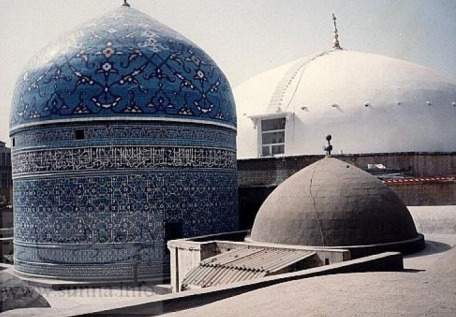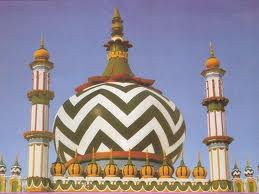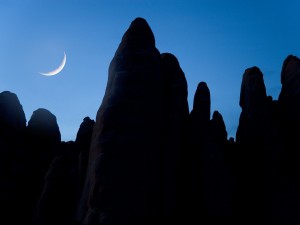Category Archives: Kalaam
The Love of Allah: An act of free choice or an involuntary compulsion?
Shaikh ‘Abd al-Qadir al-Jilani, rehmatullahi ta’aala alayhe on the love of Allah – part of a discourse given in AH 545 in Baghdad sharif – 888 years ago shared by Ruslan Moore and translated by the late Muhtar Holland (may Allah have mercy upon his soul):
At this point someone asked: “Do you see love [mahabba] as being experienced in the first instance because of an involuntary compulsion [idtiraran], or by an act of free choice [ikhtiyaran] ?â€
By way of reply, the Shaikh (may Allah be well pleased with him) went on to say:
In the case of a few isolated individuals, the Lord of Truth (Almighty and Glorious is He) simply casts His gaze upon them and He loves them. He shifts them from one thing to another in a single instant. He does not
come to love them gradually, more and more as the years go by. He loves them in a single moment, so they love Him too, of necessity. They notice that all the blessings they have received have come from Him, not from any other. They notice all His kindness and tender loving care, and all the gifts He bestows upon them, so they love Him promptly and immediately, without any gradual process or passage of time.
In the case of the vast majority, however, it is a matter of choice. Lovers begin to choose Allah (Exalted is He) in preference to His creatures, then they start choosing Him in preference not only to this world, but also to the hereafter. They start giving up things that are either strictly unlawful [haram] or merely of dubious legality [shubha], then they cut back on their consumption of things that are lawful [halal]. They prefer to lead a very simple life, making do with basic things that are readily available. They shun bed and blankets, sleep and rest.
Their sides shun their couches [as they call on their Lord in fear and hope]. (32:16)
Their night is no longer an ordinary night, and their day is no longer an ordinary day. They say: “Our God [Ilahana], we have left everything behind the backs of our hearts, and we have hastened toward You, so that
You might be well pleased.†They journey toward Him on the feet of their hearts [qulub], sometimes on the feet of their innermost beings [asrar], sometimes on the feet of their earnest intention [irada], sometimes
on the feet of their aspiration [himma], sometimes on the feet of their genuine sincerity [sidq], sometimes on the feet of their love [hubb], sometimes on the feet of their ardent longing [shawq], sometimes on the feet of their meekness [dhull] and their modest humility [tawadu’], sometimes on the feet of their fear [khawf], sometimes on the feet of their hope [raja ‘], and all of this out of love for Him and eager yearning to meet with Him.
In your own case, O questioner, you belong to the group consisting of those who love Allah (Almighty and Glorious is He) both through involuntary compulsion [idtiraran] and through a process of free choice
[ikhtiyaran]. So, since your question cannot be answered simply, either this way or that, you had better hold your tongue and concentrate on practicing Islam as it ought to be practiced!
If only you could experience all that Islam and faith [iman] can mean! If only you would leave the company of the unbelievers [kafirin] and the hypocrites [munafiqin] today, and stay away from them tomorrow. If only you would get up and walk away from meetings held by those who idolize their fellow creatures and material means [al-mushrikin bi ’l-khalq wa ’l-asbab], and who quarrel with the Lord of Truth (Almighty and Glorious is He)! You must repent and mend your ways. Do not meddle with the treasuries of worldly kings, and do not pry into their secrets.
Shaikh Hammad (may Allah the Exalted be well pleased with him) would often say: “If a person does not acknowledge his own worth, the decrees of destiny will teach him to acknowledge his own worth [man lam
ya’raf qadrahu ‘arrafat-hu ’l-aqdaru qadrah].†To recognize your own worth is better than refusing to acknowledge your own worth, because an ignorant person is someone who knows neither his own worth nor the worth of other people.
O Allah, do not include us among the ignorant, lying pretenders!
O Allah, include us among those of Your creatures who enjoy Your special favor, and:
Give us in this world good, and good in the hereafter, and guard us against
the torment of the fire! (2:201)
Ahmed Raza Khan (ra) – The 20th Century Reviver of the Faith
|
The Reviver (Mujaddid) of the 14th Century AlaHadrat Imam Ahmad Rida Khan Alaihir raHmah
He restored the deen to its original state in India when falsehood was being mixed with the truth and people were confused about Sunni beliefs and practices. Such a person is known as a “Mujaddidâ€. Hadrat Umar (may Allah be pleased with him) narrates the Messenger of Allah (peace and blessings upon him) said:
Hadrat Abu Hurayrah (may Allah be pleased with him) narrates the Noble Prophet (upon him peace and blessings) said:
|
He wrote his first ever fatwa on 14th Sha’ban 1286h on an issue of fostering (when he was only 13 years, 10 months and 4 days old!)
Imam Ahmed Rida took his spiritual pledge (bay’ah/ahd) and received khilafah in various Sufi pathways from his spiritual teacher , Sayyid Shah Aal-e-Rasul Ahmadi from Marehrah, India, in 1296H.
Travels to Hajj
First Hajj:Â In 1295h (1878 CE), at the age of 22, the great Imam traveled to perform Hajj with his father where he received Ijazahs (licenses to teach) in the traditional sciences from the great scholars of Makkah such as Sayyid Ahmad Zayni Dahlan and Mufti Abdullah bin Abd ar-Rahman Siraaj.
Event: It is narrated that Imam Ahmed Rida was near Maqam Ibrahim after Maghrib salah one evening that the Shafi’I Imam of Masjid al-Haraam Shaykh Salih Jamal al-Layl Makki (d.1320h/1884) greeted him and said: “I swear by Allah, I can see the light of Allah shine in your foreheadâ€Â and presented Ijazahs to him.
Second Hajj:Â In 1323h (1906 CE), Imam Ahmed Rida travelled to the Two Holy sanctuaries for the second time in company of his brother, Mawlana Hassan Raza Khan and son, Mawlana Hamid Raza Khan.
Event: He wrote a book called “Al-Dawlah al-Makkiyyah†in Arabic in this journey in just over eight hours without using any books on a question proposed to him by the Sharif of Makkah on the Noble Prophet ‘s (may Allah give him peace and blessings) knowledge of the unseen (ilm al-gayb). This work received a tremendous acceptance in its recital gathering in the presence of the Sharif which was attended by the prominent scholars of the time.
In the same journey, he had numerous meetings of knowledge and circles with the great Ulama who were either teaching, living or traveling in Hijaz. He produced a number of books in Arabic due to these sittings and circles …
Eid ul-Fitr as Explained by Hazrat Shaykh Abdul Qadir Jilani (1077-1166)
The Festival of Breaking Fast after Ramadan came to be called Eid for the simple reason that Allah Almighty restores joy and happiness to His servants on their day of festive celebration. The Arabic noun “Eid†or “Id†is derived from a three consonant root which conveys the basic notion of “returningâ€.
Many other explanations have been suggested, including the following sayings:
“It came to be called Eid for the simple reason that it contains the benefits of goodness bestowed by Allah Almighty, and the favors of generous grace conferred by Him upon His servant.â€
“The explanation is that the servant returns at that time to humble entreaty and weeping, and the Lord (Almighty and Glorious is He) returns at that time to the giving of presents and the granting of gifts.â€
“When people celebrate the Eid, it means that they have returned to their previous condition from the state of purity experienced while keeping the fast.â€
“It signifies that they have returned from obeying Allah Almighty directly to obeying the Messenger (Peace Be Upon Him) (this Arabic calligraphy means ‘May Allah bless the Holy Prophet (Peace Be Upon Him) and grant Him peace’), from the religious practice that is strictly obligatory to that which is customary but not compulsory and from the Fast of Ramadan to the fast of six days in the month of Shawwal.â€
“It came to be called Eid for the simple reason that the believers are told at that time: ‘Return to your dwelling places, knowing that you have been granted forgiveness!’â€
“It came to be called Eid because it is an occasion for remembering the promise and the threat, the Day of requital and superabundance, the Day of emancipation for the bondmaids and the male slaves, the approach of the Lord of Truth to His creatures near and far, and the reality of contrition and repentance from the feeble servant to the One who is All-Forgiving and Ever-Loving.â€
It was Wahb ibn Munabbih (may Allah have mercy on him) who said:
“Allah created the Garden of Paradise on the Day of Breaking the Fast; He planted the Tree of Bliss (Tooba) on the Day of Breaking the Fast; He chose Angel Gabriel (peace be upon him) as the conveyer of inspiration on the Day of Breaking the Fast; and the sorcerers found forgiveness on the Day of Breaking the Fast.â€
The Prophet (Peace Be Upon Him) is reported as having said:
“When the Day of Breaking the Fast comes around, and the people emerge from their homes to pray in the open space near the burial ground, Allah Exalted in He, will take notice of them, and He will say: ‘My servants, for My sake you have kept the fast, and for My sake you have performed the prayers. Now take your leave, knowing that you have been granted forgiveness!’â€
The following Hadeeth of the Holy Prophet (Peace Be Upon Him) is one of those reported on the authority of Hazrat Ibn Abbas (may Allah be pleased with him and his father):
“When the month of Ramadan is over, and the Night of Breaking the Fast has arrived, that night is called the Night of Prize. Then, in the early morning of the Day of Breaking the Fast, Allah Most Exalted is He, will send His angels forth to visit all the towns and cities on the earth below. Once they have made their descent, they will position themselves at the entrances to all the streets and alleys. There, in a voice that is audible to every being created by Allah Most Exalted is He, apart from the jinn and humankind, they will issue a proclamation, saying: ‘O Community of Muhammad (Peace Be Upon Him), come forth into the presence of a Noble and Generous Lord, who will grant you gifts in abundance, and forgive your terrible sin!’
Then, when the believers have emerged and presented themselves at their place of prayer, Allah Most Exalted is He, will say to His angels: ‘O My angels!’ They will respond to His call by saying: ‘We wait intent upon Your service, time and time again, and upon aiding Your cause, time and time again (labbaika wa sa’daik)!’ Then He will say to them: ‘What is the recompense of the hired laborer, once he has done his job?’ The angels will reply: ‘Our God and our Master and our Lord, You will pay him his wages in full!’ So the All-Majestic One will say: ‘I now call upon you to bear witness, O My angels, that I have conferred My acceptance and My forgiveness, as the reward for their fasting and the night vigil during the month of Ramadan.’ Then He will say: ‘O My human servants, put your requests to Me now, for this I swear, by My Might and My Majesty: You will not ask me this day, in this gathering of yours, for anything connected with your life hereafter, without My granting it to you; nor for anything connected with your life in this lower world, without my attending to your need. By My Might and My Majesty, I will surely condone the false steps you make, as long as you are consciously alert in the effort to avoid incurring My displeasure. By My Might and My Majesty, I will not put you to shame, nor will I expose you to disgrace amongst those who are faithfully committed to observing the statutes (hudood). Now you may depart, knowing that you have been forgiven. You have won My approval, and I am well pleased with you.’
The angels will then be very happy, as they welcome the good news of all that Allah Almighty and Glorious is He, will bestow upon this Community, when its members break the fast they have kept through the month of Ramadan.â€
The above excerpt was taken from Al-Ghunya li-Taalibi Tareeq al-Haqq by Shaykh Abdul Qadir Jilani (may Allah be pleased with him) translated from the Arabic by Haaji Muhtar Holland into Sufficient Provision for Seekers of the Path of Truth. (Al-Baz Publishing, Inc., Florida, 1997)
Shaykh Abdul Qadir Jilani (may Allah be pleased with him) is one of the greatest scholars and Saints of the Islamic tradition, and fountainhead of the Qadri Spiritual Order. He was born in the Iranian district of Gilan, south of the Caspian Sea, in 470 Hijri (1077 CE). Having lived a life of extreme piety, sacrifice, service, and devotion to Allah Almighty and His Messenger (Peace Be Upon Him), he passed onto the Realm of Divine Beatitude on the 11th of Rabi-uth-Thani, 561 Hijri (1166 CE). He rests in the city of Baghdad, Iraq. His blessed mausoleum is a place of pious visitation from devotees around the world.

















